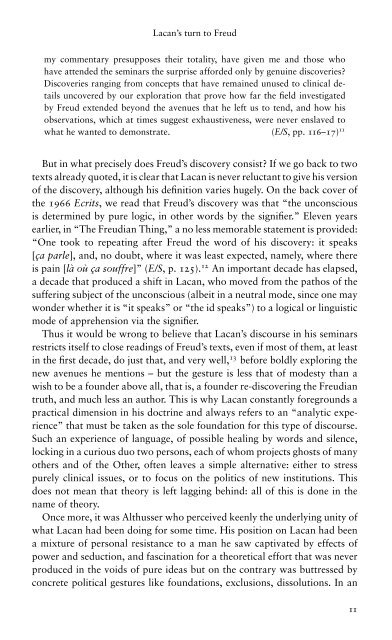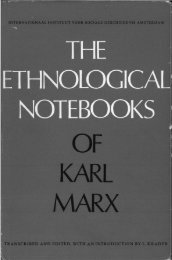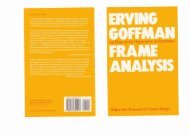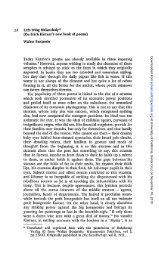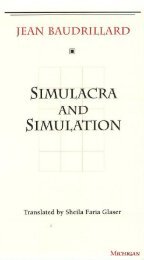X8JKsF
X8JKsF
X8JKsF
Create successful ePaper yourself
Turn your PDF publications into a flip-book with our unique Google optimized e-Paper software.
Lacan’s turn to Freud<br />
my commentary presupposes their totality, have given me and those who<br />
have attended the seminars the surprise afforded only by genuine discoveries?<br />
Discoveries ranging from concepts that have remained unused to clinical details<br />
uncovered by our exploration that prove how far the field investigated<br />
by Freud extended beyond the avenues that he left us to tend, and how his<br />
observations, which at times suggest exhaustiveness, were never enslaved to<br />
what he wanted to demonstrate. (E/S, pp. 116–17) 11<br />
But in what precisely does Freud’s discovery consist? If we go back to two<br />
texts already quoted, it is clear that Lacan is never reluctant to give his version<br />
of the discovery, although his definition varies hugely. On the back cover of<br />
the 1966 Ecrits, we read that Freud’s discovery was that “the unconscious<br />
is determined by pure logic, in other words by the signifier.” Eleven years<br />
earlier, in “The Freudian Thing,” a no less memorable statement is provided:<br />
“One took to repeating after Freud the word of his discovery: it speaks<br />
[ça parle], and, no doubt, where it was least expected, namely, where there<br />
is pain [là oùça souffre]” (E/S, p.125). 12 An important decade has elapsed,<br />
a decade that produced a shift in Lacan, who moved from the pathos of the<br />
suffering subject of the unconscious (albeit in a neutral mode, since one may<br />
wonder whether it is “it speaks” or “the id speaks”) to a logical or linguistic<br />
mode of apprehension via the signifier.<br />
Thus it would be wrong to believe that Lacan’s discourse in his seminars<br />
restricts itself to close readings of Freud’s texts, even if most of them, at least<br />
in the first decade, do just that, and very well, 13 before boldly exploring the<br />
new avenues he mentions – but the gesture is less that of modesty than a<br />
wish to be a founder above all, that is, a founder re-discovering the Freudian<br />
truth, and much less an author. This is why Lacan constantly foregrounds a<br />
practical dimension in his doctrine and always refers to an “analytic experience”<br />
that must be taken as the sole foundation for this type of discourse.<br />
Such an experience of language, of possible healing by words and silence,<br />
locking in a curious duo two persons, each of whom projects ghosts of many<br />
others and of the Other, often leaves a simple alternative: either to stress<br />
purely clinical issues, or to focus on the politics of new institutions. This<br />
does not mean that theory is left lagging behind: all of this is done in the<br />
name of theory.<br />
Once more, it was Althusser who perceived keenly the underlying unity of<br />
what Lacan had been doing for some time. His position on Lacan had been<br />
a mixture of personal resistance to a man he saw captivated by effects of<br />
power and seduction, and fascination for a theoretical effort that was never<br />
produced in the voids of pure ideas but on the contrary was buttressed by<br />
concrete political gestures like foundations, exclusions, dissolutions. In an<br />
11


